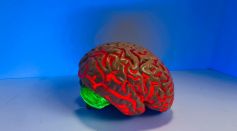Tags: Alzheimer's Disease

Scientists Find a Link Between the Herpes Simplex Virus and Alzheimer's Disease Manifested by a Clump of Protein in the Brain

Study Says Losing Even One Night's Sleep May Increase Risk For Alzheimer's
Walking May Help Identify The Type of Dementia On Patients
Alzheimer’s Disease May Be Caused by Copper In The Brain
Eyes Are Windows To The Genetic Risk for Alzheimers
Lego-like Therapeutic Brain Implants That Can Be Controlled by a Smartphone
A Vaccine to Possibly Prevent Alzheimer’s Disease Has Been Developed
Research Team Discovered Potential New Therapeutic Target for Alzheimer’s Disease
Alzheimer’s Disease May Now Be Detected Years Before Symptoms Arise
Upgraded Blood Test Detect Alzheimer's Disease
Sleep Habits May Be Directly Related to Alzheimer’s Disease
A New Type of Dementia Has Been Identified
Alzheimer’s Disease Detection Video Game Is Showing Promise
Extra-Virgin Olive Oil Discovered To Preserve Memory & Prevent Alzheimer’s Disease, Study Says
Alzheimer's Earliest Stage Recognized by Researchers From 10 Years Of Data Analysis, Anti-Amyloid Intervention Advised
Western Diet Increases Risks Of Developing Alzheimer’s Disease & Other Chronic Illnesses, Studies Reveal
Moderate Alcohol Drinkers Might Have Higher Risk Of Losing Memory And Thinking Skills, Study Says
Alzheimer's Disease Could Be Detected Through Cognitive Tests Before Symptoms Emerge
Lack Of Sleep Causes The Brain To ‘Eat Itself’ In Order To Clean Unwanted Cells But Could Develop Alzheimer’s Disease, Studies Reveal
Omega-3 Enriched Food Could Help Prevent Alzheimer’s Disease, Study Reveals
Most Popular

Will Earth's Magnetic Poles Flip Next? Magnetic Pole Reversal Explained Through Cutting‑Edge Magnetosphere Science

Relativity Time Dilation Explained: The Physics of Time and Why It Moves Differently in Space

How Lightning Science Reveals Why Charged Storms Are Rising with Global Warming Effects

How AI Is Used in Weather Prediction: Smarter Forecasting Through Machine Learning




